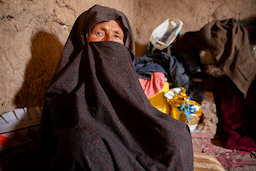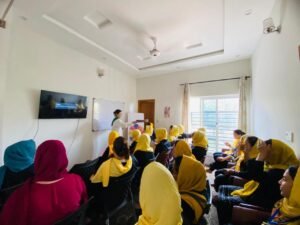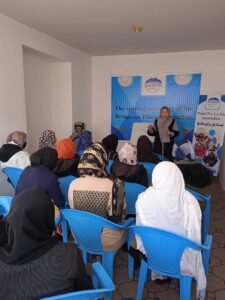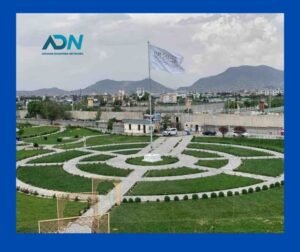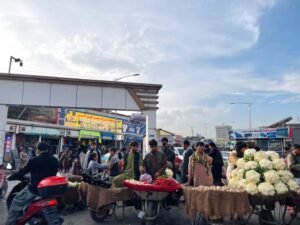Let Girls and Women Learn in Afghanistan

Afghan girls in Kabul. Photo by @Shekiba Haidary for ADN
By Rahim Jami and Deema Hiram
Background
It has been 865 days since girls at the middle and secondary levels were banned from going to school or accessing quality education and have been completely omitted from the educational system by the Taliban.
With the continued ban, youth are more disappointed, which would gradually impact them negatively. It is a disgrace to witness the continued closure of schools and universities in the 21st century, and it is a historical catastrophe. The Taliban’s decree to ban girls from education is in contradiction with the clear Islamic teachings, cultural norms, rules, and demands of the Afghan people. It serves as an example of political hostage-taking.
Restricting women’s presence in society, depriving them of freedom and rights, and engaging in gender-based discrimination and human rights violations are clear examples of Gender Apartheid[1] in Afghanistan. This will inevitably lead to a human catastrophe and make the situation more difficult day by day.
Current Situation
The Taliban’s takeover of Kabul on the 15th of August 2021 marked the beginning of a dark chapter for girls and women. They have issued over 100 decrees[2] suppressing women and girls, restricting their movement, and excluding them from society. It’s disheartening that there seems to be no hope for the reopening of schools and universities or women’s presence in public.
The impact on girls has been devastating, with emotional and psychological turmoil, including underage marriages, the sale of girls[3] due to poverty, and various forms of deprivation and violence at the family, societal, and national levels. Each day brings new restrictions and decrees from the Taliban, further isolating girls and women from their rights and the circle of life.
These restrictions not only affect women and girls but also dampen motivation among male students, parents, and teachers. The consequences can be severe, leading to poverty, violence, illiteracy, superstitions, taboos, and crime for Afghanistan and its people.
The current situation[4] has caused Afghanistan to rank very low internationally in terms of commitment to international norms and agreements. According to the UN Sustainable Development Goals (SDGs) 2023 report bySDSN[5] and Dublin University, Afghanistan is ranked 158 out of 166 countries. This ranking clearly reflects the country’s worst position and lack of progress in achieving the Sustainable Development Goals, particularly SDG4[6],which focuses on quality education until 2030. Unfortunately, Afghanistan has moved in the opposite direction of SDGs. It’s a challenging time, but we hope that positive changes will come, and the rights and education of girls and women will be restored.
In the past 20 years, Afghanistan made significant achievements in girls’ education[7]. However, the current situation and uncertain future under the Taliban’s rule have caused worry among Afghans, especially regarding the rights and opportunities for their children[8]. Since their takeover, the Taliban have disregarded national and international laws and commitments. They have imposed restrictions on civil society activists, advocates for girls’ education, demonstrators, journalists, and university professors. This suppression and imprisonment have created a challenging environment for those who were working towards positive change.
Voices of the Female Students
- “The shameful silence of the world on Afghan girls’ and women’s education bitterly shows that any human values can be ignored in political transactions and games, which has led to the loss of our rights.”
- “I want you to imagine for a second that your own daughters are not allowed to go to school or university, your wife doesn’t have the right to leave her house to buy groceries or have fun, and you are unemployed and can’t feed your family. If you can imagine this in a sober mind, then you can see that millions of human beings are currently experiencing it in Afghanistan. What would you do? Would you remain an observer or act based on the commitments you have for us?”
- “My voice breaks in my throat, and I am completely disappointed. The louder we shout, the less we are heard. We are all tired. In short, I don’t have a lot of demands, just my human rights and access to quality education that I and other girls are banned from.”
- “I feel like a prisoner in a cage that can’t breathe anymore. It has been two years since I found myself captive, following my wishes only in my thoughts. I have no feelings for life and no hope for the future. I have lost my path, and my hope lies with my creator (Allah).”
- “When I open my books, I remember my classmates. Sometimes, due to disappointment and pressure, I want to set all my books on fire. It is very hard and almost intolerable to be away from my schoolmates. I feel that I am not a normal human being. My wishes and hopes have vanished with the wind. I don’t feel like talking to anyone or going anywhere. I am more isolated and have become a stranger.”
- “Girls’ education shall not be used as a means and tool for power negotiation by the Taliban. The path that would bring our future from darkness to light shall not be used as an option on the negotiating table for sharing power and politics.”
Recommendations
We strongly urge international organizations, Islamic countries, the UN, and member states to address the following issues:
First: The UN, member states, and world leaders should take practical steps to end this human catastrophe. They should consider their commitment to Afghanistan, sustainable development goals, and international human rights conventions. Soft politics and expressions of solidarity have not yielded positive results. The Taliban must be held accountable for respecting women’s and girls’ rights. International institutions and leaders who believe in equality, justice, and human rights should support Afghan girls, women, and their families in demanding the reopening of girls’ schools and women’s access to work. Pressure should be put on the Taliban in this regard.
We expect more than just solidarity announcements and social media condemnations. World leaders need to put political pressure on the Taliban at the international level. They should ensure the urgent opening of girls’ schools and access to quality education at all levels.
Second: Islamic Countries, the Organization of Islamic Association (OIC)[9], neighboring countries, and regional players shall put necessary pressure on the Taliban and take practical and urgent steps to remove restrictions towards girls’ education and women’s rights to work and ensure the safe return of the girls and women to school and work environment. Political leaders, Islamic scholars, and societies have religious, ethical, and regional responsibility to stand beside the Afghan girls, women, and educational activists and support them to pave the ground for a developed and prosperous Afghanistan.
Third: The total ban on women and girls by the Taliban and their prohibition from their social and legal rights is gender-based discrimination and human rights violation according to Paragraphs (K) and (E) Article 7 of the Roman Constitution[10]. It is an actual example of “Gender Apartheid” in Afghanistan. Therefore, we expect urgent and practical measures to be taken by the United Nations and member countries at the international level to officially declare the current situation in Afghanistan as “Gender Apartheid”.
Fourth: Special foreign representatives and institutions for Afghanistan, international organizations, human rights organizations, research centers, and media outlets shall document atrocities, human rights violations, and discriminations based on Gender Apartheid and should release such information publicly. We remind the world leaders not to forget Afghanistan and repeat the 1996 scenario. The world should not normalize the current Afghanistan situation as the consequences would be worse beyond repair at the regional and international levels. We would witness the rise of extremism and security threats that would harm everyone (a Farsi proverb: its smoke will blind everyone), which will not be compensated[11].
Fifth: The reasons and justifications Taliban use as religious and Islamic rules to ban girls from education and women’s presence in society, is contrary to the actual religious teachings and has no logical base. Islam is supportive of education for everyone and commands otherwise[12]. Therefore, it is necessary that Afghans shall mobilize and defend girls’ rights to access education and women’s presence in society. Scholars, influencers, tribal leaders, and elders have the responsibility to put pressure on the Taliban from inside the country and consider it their historical duty and demand the reopening of the schools and girls’ access to quality education.
Afghanistan will be prosperous when there are equal opportunities for girls and boys to get educated. Education is one the strongest tools in reducing poverty and inequality and it is considered one of the bases for sustainable development.
[1] https://hrlr.law.columbia.edu/files/2022/12/Bennoune-Finalized-12.09.22.pdf
[2] https://msmagazine.com/2023/08/15/list-timeline-taliban-orders-women-girls-afghanist/
[3] https://www.washingtonpost.com/opinions/2024/01/16/afghanistan-child-brides/
[4]https://www.hrw.org/world-report/2024/country-chapters/afghanistan?fbclid=IwAR1Mjbk8nKzCg-n0H0TExPr0dqdJD2jHLx9i-UNRXzCUCg9MqbHuic3FKTk
[5] https://s3.amazonaws.com/sustainabledevelopment.report/2023/2023-sustainable-development-report.pdf
[6] https://www.unwomen.org/sites/default/files/2023-09/progress-on-the-sustainable-development-goals-the-gender-snapshot-2023-en.pdf
[7] https://www.unesco.org/en/articles/let-girls-and-women-afghanistan-learn
[8] https://unama.unmissions.org/sites/default/files/human_rights_situation_in_afghanistan_jul-sep_2023.pdf
[9] https://www.arabnews.com/node/2404866/saudi-arabia
[10] https://www.icc-cpi.int/sites/default/files/RS-Eng.pdf
[11] https://www.ecoi.net/en/file/local/2095654/N2318974.pdf
[12]https://www.taylorfrancis.com/books/mono/10.4324/9780203381373/islam-economics-society-rle-politics-islam-syed-nawab-haider-naqvi


